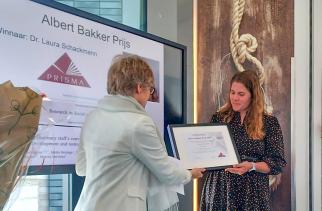Publicatie
Publicatie datum
Pharmacy staff-patient interactions in challenging situations: understanding the roots and ways to flourish patient-centered communication.
Schackmann, L. Pharmacy staff-patient interactions in challenging situations: understanding the roots and ways to flourish patient-centered communication. Utrecht: Nivel, 2023. 210 p. Proefschrift Rijksuniversiteit Groningen
Download de PDF
In Nederland gebruiken veel mensen dagelijks medicijnen. Ongeveer een derde van alle medicijnen die apothekers verstrekken, wordt verkeerd of helemaal niet gebruikt door patiënten. Verkeerd medicijngebruik kan leiden tot bijwerkingen, een verminderde werking van het medicijn en in sommige gevallen zelfs tot ziekenhuisopnames. Om deze negatieve gevolgen te voorkomen, is het belangrijk om patiënten te ondersteunen met goede informatie en duidelijke communicatie bij het gebruik van medicijnen, vooral in uitdagende situaties. Uitdagende situaties in de apotheekpraktijk, zoals gedefinieerd in dit proefschrift, zijn situaties die buiten de invloedssfeer van het apotheekteamlid of de patiënt liggen en die van invloed kunnen zijn op het geneesmiddelgebruik. Bijvoorbeeld, onverwachte situaties zoals COVID-19, wisselingen in medicatie door leveringsproblemen of het preferentiebeleid. Ook kunnen patiëntkenmerken die niet snel te veranderen zijn zoals beperkte gezondheidsvaardigheden en laaggeletterdheid invloed hebben op het geneesmiddelgebruik. Een uitdagende situatie kan aan de apotheekbalie leiden tot een gebrek aan wederzijds begrip tussen het apotheekteamlid en de patiënt, met daarbij meer onzekerheid en sterke emoties. Daarom vragen dit soort situaties bij uitstek om heldere informatie voor patiënten en duidelijke communicatie tussen het apotheekteamlid en patiënt.
Het doel van dit proefschrift is inzicht te krijgen in de vraag hoe het apotheekteam patiënten kan ondersteunen in verschillende uitdagende situaties met behulp van patiëntgerichte informatievoorziening en communicatie. Dit houdt bijvoorbeeld in dat apotheekteamleden patiënten goed informeren en weten hoe ze kunnen inspelen op de (mogelijk emotionele) reactie van een patiënt tijdens een baliegesprek.
Het doel van dit proefschrift is inzicht te krijgen in de vraag hoe het apotheekteam patiënten kan ondersteunen in verschillende uitdagende situaties met behulp van patiëntgerichte informatievoorziening en communicatie. Dit houdt bijvoorbeeld in dat apotheekteamleden patiënten goed informeren en weten hoe ze kunnen inspelen op de (mogelijk emotionele) reactie van een patiënt tijdens een baliegesprek.
In the Netherlands, many people use medication on a daily basis. In 2019, 75% of Dutch patients used one to five different medicines. About one third of all medication dispensed by pharmacists is used incorrectly or not used at all. Due to improper medication use, the number of drug-related hospitalizations in the Netherlands was 49,000 in 2013,2 and of these admissions 50% were preventable. The number of drug-related hospitalizations are probably the tip of the iceberg of preventable drug harm. Unnecessary side effects and lower quality of life are examples of other consequences of medication errors. To prevent drug-related problems, there is a need to support patients and even more so in challenging situations. A challenging situation as defined in this thesis, is
a situation outside the influence of the pharmacy team member or patient and where someone’s ability or determination to perform a task are tested. For example, unexpected situations such as COVID-19, changes in medication due to delivery problems or the preference policy. Patient characteristics that cannot be changed quickly, such as limited health skills and low literacy, can also influence medication use. A difficult situation can lead to a lack of mutual understanding between the pharmacy team member and the patient, with more uncertainty and strong emotions. That is why these types of situations pre-eminently require clear information for patients and clear communication between the pharmacy team member and patient.
The aim of this thesis is to gain insight into how the pharmacy team can support patients in various challenging situations using patient-oriented information and communication. This means, for example, that pharmacy team members inform patients well and know how to respond to a patient's (possibly emotional) reaction during a counter conversation.
a situation outside the influence of the pharmacy team member or patient and where someone’s ability or determination to perform a task are tested. For example, unexpected situations such as COVID-19, changes in medication due to delivery problems or the preference policy. Patient characteristics that cannot be changed quickly, such as limited health skills and low literacy, can also influence medication use. A difficult situation can lead to a lack of mutual understanding between the pharmacy team member and the patient, with more uncertainty and strong emotions. That is why these types of situations pre-eminently require clear information for patients and clear communication between the pharmacy team member and patient.
The aim of this thesis is to gain insight into how the pharmacy team can support patients in various challenging situations using patient-oriented information and communication. This means, for example, that pharmacy team members inform patients well and know how to respond to a patient's (possibly emotional) reaction during a counter conversation.


